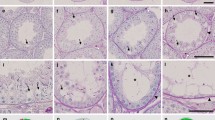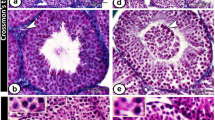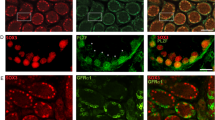Abstract
WHILE using autoradiography to study DNA synthesis and cell cycles of spermatogenesis, we have noted a consistent preferential localization of tritiated thymidine in spermatogonia of the peripheral seminiferous tubules of the testis, and a significantly lower thymidine uptake in the tubules of interior regions.
This is a preview of subscription content, access via your institution
Access options
Subscribe to this journal
Receive 51 print issues and online access
$199.00 per year
only $3.90 per issue
Buy this article
- Purchase on Springer Link
- Instant access to full article PDF
Prices may be subject to local taxes which are calculated during checkout
Similar content being viewed by others
References
Monesi, V., J. Cell Biol., 14, 1 (1962).
Gude, W., Autoradiographic Techniques, 27 (Prentice-Hall, Englewood Cliffs, 1968).
Van Tienhoven, A., Reproductive Physiology of Vertebrates, 47 (W. B. Saunders, Philadelphia, 1968).
Waites, G. M. H., and Moule, C. R., J. Reprod. Fertil., 2, 213 (1961).
Author information
Authors and Affiliations
Rights and permissions
About this article
Cite this article
HUNTER, J., MANNING, E. Peripheral Localization of DNA Synthesis in the Seminiferous Epithelium. Nature 223, 632–633 (1969). https://doi.org/10.1038/223632a0
Received:
Revised:
Issue Date:
DOI: https://doi.org/10.1038/223632a0
Comments
By submitting a comment you agree to abide by our Terms and Community Guidelines. If you find something abusive or that does not comply with our terms or guidelines please flag it as inappropriate.



